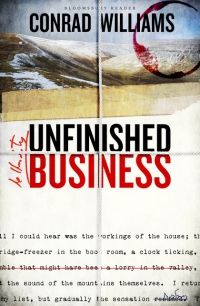
Published by Bloomsbury Reader on May 5, 2016
Unfinished Business is an industry novel, the kind that focuses with a jaundiced eye on the movie industry, the fashion industry, or similar businesses that manufacture or trade upon celebrity status. This one is about the book industry, told from the perspective of an agent. Books about a personal service business aren’t very interesting unless someone takes a Machiavellian approach to the business. Fortunately, a couple of agents in Unfinished Business go to war, which provides the novel with its greatest entertainment value.
Few of the characters are happy. Vince Savage, a once promising writer, senses that his writing career is imploding. His wife Madelin is concerned that her weakened ability to control Vince might require the wake-up call that only a good dose of infidelity can deliver. Their daughter Holly dials random numbers and calls the person who answers a “stupid idiot.” Vince and Frank Jones, a war reporter, have equal disrespect for the other’s profession. Mike de Vere, a literary agent, spends much of the novel questioning his purpose, self-worth, and place in the universe.
As the novel opens, Mike has just been canned by his most promising new author. To make the day worse, a sycophantic upstart in the office named Colin Templar wants to get rid of all the mid-list clients who don’t produce best-sellers (meaning most of the writers who have actual literary talent), in favor of writers like Dan Brown who are more marketable. Why look for potential Booker winners when the public would rather read supermodel memoirs?
Soon Mike is competing for clients and for love. While wondering if he is “hampered by romantic, old-fashioned character traits” in his quest for happiness, Mike understands that he is incapable of “strategic reinvention.” Mike does not want to abandon his B-list of literary writers, even though they no longer seem capable of producing anything worth reading. Naturally, his career takes a self-inflicted tumble and the novel’s dramatic tension, such as it is, centers on whether he will recover.
Characters engage in spirited but well-worn debates about the value of compelling literature that few people read versus bestsellers that are forgotten as the reader moves on to the next trendy book. One side argues that writers should “address the concerns of contemporary readership” (e.g., sex) while the other contends that “any kind of prescription in the arts leads to mediocrity.” I particularly liked the reference to “genre envy.” The notion that there is a place in the world both for serious literature and fun fiction (as well as the miraculous novel that satisfies both criteria) doesn’t seem to occur to any of the characters, although that might be Conrad Williams’ point.
Mike’s critique of Vince’s latest unsellable novel is my favorite part of the story. It describes the work of many literary authors who have mistaken success for a license to become self-indulgent. Clever wordplay becomes an end in itself, “the thrall of narrative” becomes a substitute for the truth that fiction should broadcast. Mike’s argument is really a criticism of “postmodern detachment” that illustrates the shallowness of modern life by telling an empty story about vapid people when readers crave depth of character and a plot that delivers profound insight into human nature.
How does Unfinished Business fare under Mike’s standard of a great novel? It’s more an entertaining soap opera than a novel of great emotional truth. It is only modestly insightful. A self-revelatory moment at the end about the difference between love and sex is banal. Stretches of the story are less than absorbing and the rest is more clever than smart. But clever is more than most writers accomplish and the parts of the novel that worked for me worked quite well. The tidy ending is conventional, the kind of ending that an agent might suggest to an author to maximize sales of a book. I suppose that’s consistent with the novel’s overall theme but it doesn’t have the ring of honesty. Still, Williams’ prose is strong and the novel delivers enough amusing moments to overcome its faults.
RECOMMENDED WITH RESERVATIONS